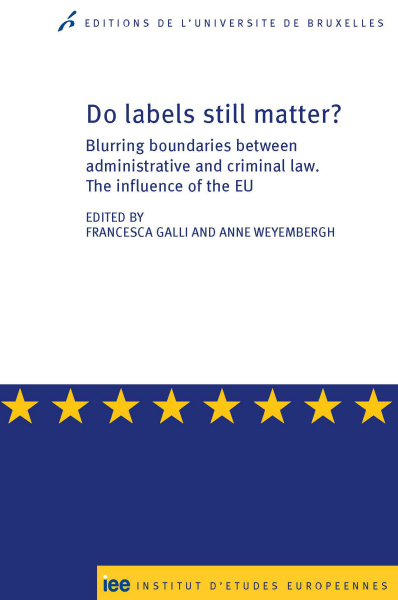Do Labels still matter?
Blurring boundaries between administrative and criminal law. The influence of the EU
Première édition
Criminal law has considerably evolved in the last few decades. A number of new trends have challenged the traditional features of “modern criminal law”. Lire la suite
One of the new trends affecting criminal justice systems is the so-called “Europeanisation process”, which is the result of the growing intervention of the EU in the area of criminal law. Another new trend which criminal law and other legal disciplines are facing is the increasingly blurred dividing line between legal categories. Various dimensions of this unclear division between categories have been identified in legal literature, in particular between administrative and criminal law.
This book aims to study the combination of the two abovementioned trends and their impact on criminal justice systems. The hazy line between administrative and criminal law has been around for a while and has grown independently of the European Union. Up until now, it has mainly been analysed at the national level in a sector by sector approach. This research aims to go beyond such an approach to the topic and sets a systematised assessment of the situation in motion. The main questions that this book tackles are whether and to what extent the EU contributes to the blurred line and whether it tries to restrict it, hold it in check and/or organise it.
In order to reflect upon such issues, the book is divided into two parts.
The first part focuses on an analysis of selected case studies, namely different types of crimes where the EU plays an increasing role: trafficking in human beings, terrorism, protection of the EU’s financial interests, market abuse, environmental offences and competition. These case studies are ordered into four different categories based on how broad and significant the intervention of administrative measures/actors is in the fight against crime.
The second part of the book is of a more general nature. Following an article concerning the organisation of the coexistence of administrative and criminal law at the national level, the other contributions focus on the EU level and aim to assess the influence of the EU on the existence and development of the hazy line between administrative and criminal law. Most of them show that the EU somehow contributes to the lack of clarity. They tend to identify the main reasons for this and the potential problems caused by the blurred line in terms of individual procedural safeguards and the effectiveness of the fight against crime.
This book is the result of cooperation within an international team mainly composed of academics and researchers who are members of ECLAN (the European Criminal Law Academic Network) and of practitioners working at the national or EU level.
Spécifications
- Éditeur
- Éditions de l'Université de Bruxelles
- Édité par
- Francesca Galli, Anne Weyembergh,
- Introduction de
- Anne Weyembergh,
- Contributions de
- Antoine Bailleux, Chloé Brière, Pedro Caeiro, Philippe de Koster, Michael Faure, Francesca Galli, Armelle Gouritin, Katalin Ligeti, Michiel Luchtman, Matjaž Jager, Vincent Jamin, Robert Kert, Marc Penna, Robert Roth, Michele Simonato, Katja Šugman Stubbs, Christoffer Wong,
- Collection
- Études européennes | n° 57
- ISSN
- 13780352
- Langue
- anglais
- Site web ressource
- Oapen.org
- Catégorie (éditeur)
- > Droit
- BISAC Subject Heading
- LAW026010 LAW / Criminal Law / Juvenile Offenders
- Code publique Onix
- 06 Professionnel et académique
- CLIL (Version 2013-2019 )
- 3259 DROIT
- Subject Scheme Identifier Code
- Classification thématique Thema: Droit international public : droit pénal
Livre broché
- Date de publication
- 03 novembre 2014
- ISBN-13
- 978-2-8004-1577-2
- Ampleur
- Nombre de pages de contenu principal : 258
- Code interne
- 1577
- Format
- 160 x 240 x 15 cm
- Poids
- 469 grammes
- ONIX XML
- Version 2.1, Version 3
Google Livres Aperçu
Compte rendu
- Source
- Michel Theys
Sommaire
- FOREWORD
- Introduction | Anne WEYEMBERGH
- PART I – Case studies on the intervention of administrative law in the criminal law domain
- Combatting trafficking in human beings: moving beyond labels with the EU's multidisciplinary, integrated and holistic approach | Chloé BRIÈRE
- The freezing of terrorists’ assets: preventive purposes with a punitive effect | Francesca GALLI
- The case of money laundering. Real administrative procedure used in the detection of fraudulent transactions | Philippe DE KOSTER and Marc PENNA
- Multidisciplinary investigations into offences against the financial interests of the EU: a quest for an integrated enforcement concept | Katalin LIGETI and Michele SIMONATO
- The relationship between administrative and criminal sanctions in the new market abuse provisions | Robert KERT
- Blurring boundaries between administrative and criminal enforcement of environmental law | Michael FAURÉ and Armelle GOURITIN
- The fiftieth shade of grey. Competition law, "criministrative law" and “fairly fair trials” | Antoine BAILLEUX
- PART II – Cross-cutting issues on the interplay between criminal and administrative law
- The organization of administrative and criminal law in national legal systems: exclusion, organized or non-organized co-existence | Katja ŠUGMAN STUBBS and Matjaž JAGER
- The influence of the EU on the “blurring” between administrative and criminal law | Pedro CAEIRO
- Inter-state cooperation at the interface of administrative and criminal law | Michiel LUCHTMAN
- Blurring boundaries between administrative and criminal law: from the perspective of an EU agency | Vincent JAMIN
- Criminal sanctions and administrative penalties: the quid of the ne bis in idem principle and some original sins | Christoffer WONG
- Concluding remarks | Robert ROTH
- List of contributors


Compte rendu